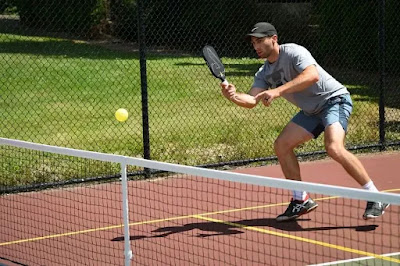11 Essential Tips for Intermediate Pickleball Players
If you're an intermediate pickleball player looking to up your game, we've got you covered. In this article, we'll provide you with 11 game-winning tips that will help improve your performance on the court. Whether it's mastering specific shots, understanding strategic moves, or focusing on mental preparation, these tips are designed to enhance your skills and give you an edge over your opponents. So, let's dive in and explore these valuable tips that can take your pickleball game to the next level!
 |
| 11 Essential Tips for Intermediate Pickleball Players |
Pickleball tips for intermediate players
1. Warm-Up
Before starting any game, it's crucial to warm up properly. A warm-up serves two purposes: physical and mental preparation. Physically, it allows your body to gradually adjust to the demands of the game, preventing injuries and enhancing your performance. Mentally, a consistent warm-up routine can help you feel more confident and mentally prepared for the match ahead.
2. Stay Ready
The ready position is the foundation of a strong pickleball game. Whether the ball is in play or not, it's essential to always stay in the ready position. This means keeping your paddle up, bending your knees, and being prepared to move swiftly in any direction. By staying ready, you'll maintain a mental and physical advantage over your opponents.
3. Master Your Backhand
Backhand shots can be challenging for many players. Mastering your backhand technique will not only make you a more versatile player but also allow you to return shots accurately from anywhere on the court. Additionally, target your opponent's backhand whenever possible since it's often their weaker side, increasing your chances of gaining an advantage.
4. Concentrate on Shots
While it may seem obvious, concentrating on your shots can make a significant difference in your gameplay. Take the time to carefully observe your opponent's positioning on the court and identify their weaknesses. By focusing closely and exploiting those weaknesses, you can strategically outmaneuver and outplay your opponent.
5. Utilize Deep Serves and Returns
As the serving team, aim to hit deep serves that keep your opponents away from the net. By doing so, you limit their ability to approach the non-volley zone, giving you more control over the game. Similarly, when returning serves, try to hit deep shots to prevent the serving team from gaining an advantage.
6. Aim for Your Opponent's Feet
When serving or playing dinks, aim for your opponent's feet. This strategy forces them to back up in order to return your shot, putting them in a difficult position. By aiming low, you disrupt their rhythm and make it harder for them to execute their shots effectively.
7. Target the Weaker Opponent in Doubles
In doubles play, it's crucial to identify the weaker player on the opposing team and strategically direct your shots towards them. By exploiting their weaknesses, you can gain a significant advantage and put pressure on their side of the court. Keep peppering them with challenging shots, utilizing the techniques we've discussed earlier.
8. Return Serves Down the Middle
Returning serves down the middle of the court is an effective but often overlooked strategy. Instead of hitting towards your opponent's strong forehand, aim for the middle or the weaker side. This approach disrupts their positioning and makes it harder for them to execute powerful shots.
9. Foster Good Teamwork
Effective communication and coordination with your doubles partner are essential for success. Maintain constant communication by calling out "Good" or "Out" to indicate whether the ball is in play or out of bounds. During the crucial third shot, which is often hit down the middle, clearly communicate whether it's your shot ("Mine") or your partner's shot ("Yours"). Avoid confusion and hesitation by following your partner's movements and visual cues, allowing you to anticipate their actions and respond accordingly.
10. Strategically Position the Stronger Player in Doubles Matches
When playing doubles, it's beneficial to have the stronger server start the game to increase your chances of scoring immediate points. Additionally, it's common for competitive doubles teams to position their stronger player on the left-hand side of the court. This placement allows them to utilize their forehand shots more effectively and maintain control of the center court area.
11. Master Dink Shots
When it comes to dinking, quick footwork is essential. Incorporate lateral shuffling into your dynamic warm-up routine to improve your movement on the court. Position yourself as close to the non-volley zone as possible during dinking exchanges. When executing a dink, use an open paddle face and prioritize cross-court shots. Aim for your opponent's feet whenever possible, creating challenging shots that force them to make difficult returns. Occasionally, mix things up by dinking down the middle, keeping your opponents on their toes.
Common Mistakes Made by Intermediate Players
1. Hitting Drop Shots Too Low
To make your drop shots more challenging to return, focus on using backspin and slicing the ball to maintain control. Avoid being overly aggressive with hitting the ball too low, as it may result in hitting the net and causing a fault.
2. Returning Dinks Too High
When returning dinks, be mindful of not popping the ball too high. This can leave you vulnerable to aggressive smashes from the opposing team. Aim for controlled returns that keep the ball low and within the opponent's reach.
3. Neglecting Spin in Gameplay
While beginners may not prioritize spin, intermediate players should embrace it as a valuable technique. Incorporating backspin and topspin into your shots adds depth and variety to your gameplay. Spin helps the ball bounce lower, making it more challenging for your opponents to return accurately.
By avoiding these common mistakes and implementing the tips provided in this article, you'll be well on your way to taking your pickleball game to new heights. Practice, patience, and a focus on continuous improvement will lead you to success on the court.




